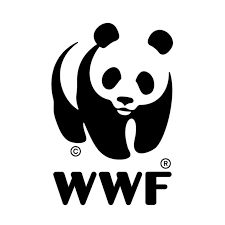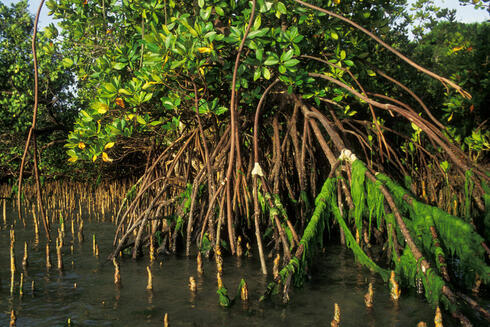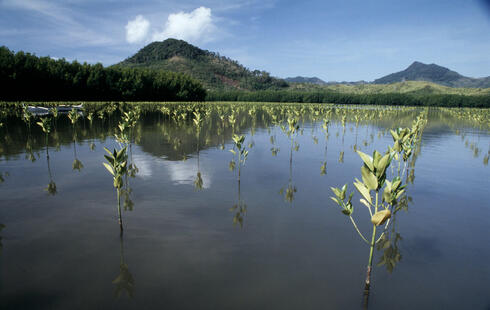
https://www.worldwildlife.org/stories/what-to-expect-from-this-year-s-in...
Beginning November 6th, thousands of people from nearly every nation on Earth descended upon Sharm El-Sheikh, Egypt, a coastal town on the southern edge of the Sinai Peninsula. The 27th Conference of the Parties of the United Nations Framework Convention on Climate Change, called COP 27 for short, happens at an inflection point, where we must move from talking about climate solutions to actually implementing them.
The milestones we need to meet in order to ensure a livable climate future are clear. We must halve emissions by 2030 and reach “net zero” emissions by 2050. That gives us roughly seven years to decarbonize at least half of our global economy. And the most recent Emissions Gap Report from the United Nations Environment Program indicates that we are nowhere near what it will take to reach the goal.
The United States delegation arrived in Egypt having notched a significant legislative win with the passage of the Inflation Reduction Act. Most estimates say that the Act will generate a 40% reduction in emissions in the US by 2030. While that is short of the 50% reduction needed to meet the 2030 goal, it’s enough of a start to give the American government more credibility to call for increased ambition from other high-emitting countries, even as decision-makers at every level in the US continue to address both implementation of the legislation and how to close the remaining gap.
But ambitions and promises need to translate into action. At this COP, we are looking for moments where we can set the stage to begin the real work and challenges around decarbonization. Solving climate change is not done with a single idea or single actor, but rather the deployment of a set of diverse solutions.
One of the most underused and underfunded elements of this solution set is nature itself.
 © naturepl.com / Jouan & Rius / WWF
© naturepl.com / Jouan & Rius / WWF
The ability of nature to sequester carbon and bolster resilience makes it a critical component of the climate change fight. But as documented in WWF’s most recent Living Planet Report 2022, nature is itself in crisis, and this is creating even deeper climate problems. Deforestation and land conversion not only destroy critical habitats, but they are also a significant source of increased carbon emissions and push us ever closer to dangerous moments for both the climate and the health of key ecosystems. The UN estimates that to meet even just the forest restoration requirements necessary to reach our climate goals, we will need between $36 billion and $49 billion of finance every year.
At COP27, we are looking to hear more about the implementation of projects that scale the full suite of nature-based solutions which can deliver as many climate benefits as possible, with both urgency and integrity. Nature-based solutions must be paired with real emissions reductions and also deliver benefits for biodiversity and the human communities that depend on nature to thrive. At WWF, we’re keeping the focus squarely on nature, people, and climate in all our work.
We hope to see great progress in the transformation of our food systems.
It should be no surprise that COP27 is highlighting issues around food systems as climate change increasingly impacts agricultural production, exacerbating issues around global food security and contributing to human conflict and instability in many parts of the world. Unsustainable methods of food production are themselves a major driver of climate change, and we need to see real progress, including by the private sector, to deliver on commitments to take deforestation and conversion out of their supply chains on a clear, science-based timetable. We’ll also be looking for breaking news of announcements around the adoption of climate-smart farming practices and other food and agriculture practices.
 © Alffoto
© AlffotoTransformation does not happen without financial resources.
Last year at the climate talks in Glasgow, we saw the creation of the Glasgow Financial Alliance for Net Zero (GFANZ), a group of large asset owners committed to contributing more than $130 trillion in private capital to reach a net zero global economy. A year later, many institutions are now more lukewarm on this commitment, with some banks threatening to leave GFANZ if it chooses to require them to demonstrably phase out financing for new fossil fuels, including for new coal. We hope to see financial institutions during COP27 be held accountable for their pledges and offer real action, both in terms of financial commitments and climate risk management practices.
We also need governments to deliver on outstanding commitments to provide public capital for climate finance in the developing world. The developed world has not yet hit the $100 billion a year it promised in climate talks in Copenhagen in 2009 for efforts to help the least developed and most vulnerable countries build their resilience to worsening climate impacts while growing their economies in ways that avoid increasing global carbon emissions. The US remains a laggard in this respect, and we need Congress to provide the resources needed to meet President Biden’s pledge of $11.4 billion in climate finance by 2024.
Relatedly, we need to see real progress on the issue of loss and damage at COP27, given that it is a top priority for those countries currently bearing impossible costs in human life and resources from climate impacts. We recognize the political challenges this issue poses for countries such as the US, but these pale in comparison to the existential challenges facing countries that are being hit first and worst by climate-driven disasters at the same time as they bear little to no historical responsibility for the causes of these catastrophic events. The latest signals are that the Biden Administration intends to engage constructively on this issue at COP27, and we hope these foretell forward movement on what has recently proven a major stumbling block in the negotiations.
The threat climate impacts pose from a risk management perspective are now too great to ignore, and those impacts only grow worse if we are not prepared to commit the financing necessary—both for mitigation and adaptation. Governments are now understanding this by encouraging enhanced climate-related disclosure and transparency, but we need more policy.
We're hoping to see announcements that advance some of the most urgent international needs.
 © Vin J. Toledo / WWF
© Vin J. Toledo / WWF
We're hoping parties progress in areas such as:
- Establishing a transparent and common understanding of how to accelerate action at every level and assess progress toward a Global Goal on Adaptation (GGA),
- Creating ambitious, time-bound targets to fulfill their existing commitments to reforestation and conservation, along with a common transparent framework for monitoring and verification of their targets.
- Substantive finance commitments that exceed the $100 billion objective from developed countries this year, and exceed $600 billion by 2025, and
- Creating strategies for all relevant sectors, including food systems, energy, transport, industry, waste, urban areas, oceans, and coastal areas that fully mobilize nature-based solutions, and fully engage Indigenous peoples and local communities.
Every annual climate talk is a big event and every year the urgency only increases. There is so much activity crammed into two weeks, into one convention hall. It can seem overwhelming. But so will the impacts of climate change if we don't do anything to address it. The storms that pound our shores and destroy our communities are not going to stop. The wildfires that have consumed thousands upon thousands of acres are not going to hold back. The challenges that all these disruptions will create for our businesses, our families, and our communities are only increasing. Climate change will not let up, and that means that we can’t either.
- 980 reads










Add new comment